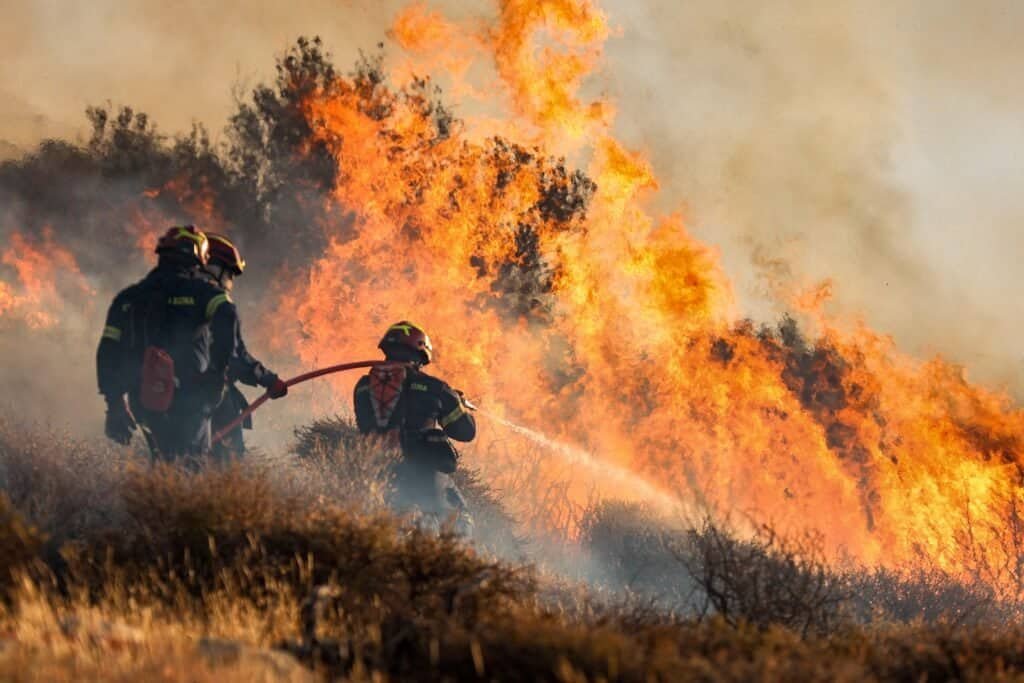The Greek island of Crete is in crisis as massive wildfires rage for a third straight day, fueled by a brutal heatwave sweeping across Southern Europe. With temperatures soaring past 43°C, emergency crews are battling flames near tourist areas, cultural landmarks, and dry forests — while thousands are evacuated in what authorities now call a climate emergency.
🔥 Firefronts expand, tourists flee resorts
More than 130 firefighters, supported by six helicopters and aircraft, are deployed across Crete, where the most dangerous flames are concentrated near the popular coastal city of Rethymno. Authorities report that over 5,000 people, including tourists and locals, have been evacuated from hotels, villages, and beach resorts.
Emergency crews are working under extreme conditions, with dry winds and scorching temperatures making it nearly impossible to contain the blaze. Fires have also spread to the forested areas near Agios Vasilios and Preveli, putting centuries-old monasteries and cultural heritage sites at risk.
“The conditions are explosive. This is no longer just a wildfire — it’s a regional emergency,” said one civil protection official.
🌡️ Southern Europe in extreme heat crisis
The fires come as Southern Europe is gripped by an intense heatwave. In Athens, authorities shut down the Acropolis during midday hours to protect tourists. Rome recorded 42°C, and in southern Spain, Córdoba reached 45.2°C — one of the highest June temperatures ever recorded in Europe.
According to the Copernicus Climate Change Service, heatwaves like this are becoming longer, deadlier, and more widespread. Scientists link this event directly to climate change and warn that Europe is entering an era of regular “mega-heatwaves.”
🚨 Greece declares regional state of emergency
The Greek government has declared a state of emergency across Crete and parts of the Peloponnese. The Ministry of Civil Protection activated its national disaster response plan, known as IRIS, triggering full-scale mobilization of firefighting, health, and logistics services.
Outdoor labor and agriculture have been suspended between 12:00 and 17:00. Health centers across Crete and southern Greece have shifted to emergency mode as they treat a spike in heatstroke, dehydration, and respiratory complications.
Prime Minister Kyriakos Mitsotakis issued a stark warning on national television:
“Climate change is no longer theoretical. It’s here, it’s real, and it’s testing our ability to respond.”
🌍 Regional fallout and tourism under pressure
Crete — one of the Mediterranean’s most visited summer destinations — is now facing cancellations and rerouted travel bookings, as tourists seek cooler alternatives in northern regions and mountain villages. The economic fallout could be steep if the wildfires persist.
The ripple effects are being felt across the Balkans. Albania, North Macedonia, and Serbia have issued similar heat warnings, with temperatures in Shkodër and Elbasan expected to hit 41°C. In Kosovo, meteorologists have warned of high wildfire risk through the weekend.
Climate experts say these events are not isolated. Without coordinated mitigation efforts, heat-driven disasters are expected to become the new normal for Southeastern Europe — with severe consequences for public health, agriculture, infrastructure, and the tourism sector.



